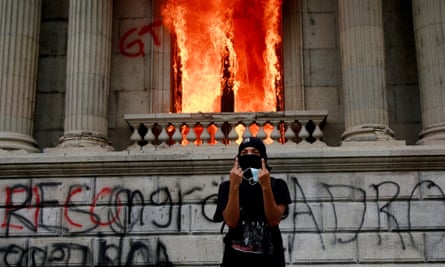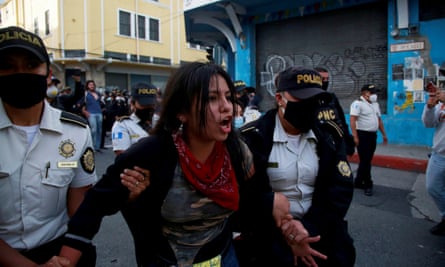Public anger targets President Alejandro Giammattei over cuts to education and health

A demonstrator gestures outside the congress building in Guatemala City during clashes between police and protesters on Saturday.
Photograph: Esteban Biba/EPA
Hundreds of protesters broke into Guatemala’s congress and burned part of the building amid growing demonstrations against President Alejandro Giammattei and the legislature for approving a budget that cut educational and health spending.
The incident on Saturday came as about 10,000 people were protesting in front of the National Palace in Guatemala City against corruption and the budget, which protesters say was negotiated and passed by legislators in secret while the Central American country was distracted by the fallout of back-to-back hurricanes and the Covid-19 pandemic.
About 1,000 protesters were demonstrating outside the Congress building.
Video on social media showed flames coming out of a window in the legislative building. Police fired tea gas at protesters, and about a dozen people were reported injured.
“We are outraged by poverty, injustice, the way they have stolen the public’s money,” said Rosa de Chavarría, a psychology professor.
“I feel like the future is being stolen from us. We don’t see any changes. This cannot continue like this,” added Mauricio Ramírez, a 20-year-old university student.
The amount of damage to the building was unclear, but the fire appears to have affected legislative offices rather than the main hall of congress. Protesters also set bus stations on fire.

Hundreds of protesters broke into Guatemala’s congress and burned part of the building amid growing demonstrations against President Alejandro Giammattei and the legislature for approving a budget that cut educational and health spending.
The incident on Saturday came as about 10,000 people were protesting in front of the National Palace in Guatemala City against corruption and the budget, which protesters say was negotiated and passed by legislators in secret while the Central American country was distracted by the fallout of back-to-back hurricanes and the Covid-19 pandemic.
About 1,000 protesters were demonstrating outside the Congress building.
Video on social media showed flames coming out of a window in the legislative building. Police fired tea gas at protesters, and about a dozen people were reported injured.
“We are outraged by poverty, injustice, the way they have stolen the public’s money,” said Rosa de Chavarría, a psychology professor.
“I feel like the future is being stolen from us. We don’t see any changes. This cannot continue like this,” added Mauricio Ramírez, a 20-year-old university student.
The amount of damage to the building was unclear, but the fire appears to have affected legislative offices rather than the main hall of congress. Protesters also set bus stations on fire.

A demonstrator is arrested during clashes between the police and protesters in Guatemala City on Saturday. Photograph: Esteban Biba/EPA
Giammattei condemned the incidents via Twitter on Saturday, saying: “Anyone who is proven to have participated in the criminal acts will be punished with the full force of the law.”
He said he defended people’s right to protest, “but neither can we allow people to vandalise public or private property”.
The president said he had been meeting with various groups to present changes to the controversial budget.
Discontent had been building on social media over the 2021 budget and clashes erupted during demonstrations on Friday. Guatemalans were angered because lawmakers approved $65,000 to pay for meals for themselves, but cut funding for coronavirus patients and human rights agencies.
Protesters were also upset by recent moves by the supreme court and attorney general they saw as attempts to undermine the fight against corruption.
The vice-president, Guillermo Castillo, has offered to step down, telling Giammattei that both men should resign their positions “for the good of the country”. He also suggested vetoing the approved budget, firing government officials and reaching out more to various sectors around the country.
Giammattei had not responded publicly to that proposal and Castillo did not share the president’s reaction to his proposal. Castillo said he would not resign alone.
The spending plan was negotiated in secret and approved by congress before dawn Wednesday. It also passed while the country was recovering from hurricanes Eta and Iota, which brought torrential rains to much of Central America.
The Roman Catholic Church leadership in Guatemala called on Friday for Giammattei to veto the budget.
“It was a devious blow to the people because Guatemala was between natural disasters, there are signs of government corruption, clientelism in the humanitarian aid,” said Jordan Rodas, the country’s human rights prosecutor.
He said the budget appeared to favour ministries that have historically been hotspots of corruption.
In 2015, mass streets protests against corruption led to the resignation of President Otto Pérez Molina, his vice-president, Roxana Baldetti, and members of his cabinet. The former president and Baldetti are in jail awaiting trials in various corruption cases.
Topics
Guatemala
Giammattei condemned the incidents via Twitter on Saturday, saying: “Anyone who is proven to have participated in the criminal acts will be punished with the full force of the law.”
He said he defended people’s right to protest, “but neither can we allow people to vandalise public or private property”.
The president said he had been meeting with various groups to present changes to the controversial budget.
Discontent had been building on social media over the 2021 budget and clashes erupted during demonstrations on Friday. Guatemalans were angered because lawmakers approved $65,000 to pay for meals for themselves, but cut funding for coronavirus patients and human rights agencies.
Protesters were also upset by recent moves by the supreme court and attorney general they saw as attempts to undermine the fight against corruption.
The vice-president, Guillermo Castillo, has offered to step down, telling Giammattei that both men should resign their positions “for the good of the country”. He also suggested vetoing the approved budget, firing government officials and reaching out more to various sectors around the country.
Giammattei had not responded publicly to that proposal and Castillo did not share the president’s reaction to his proposal. Castillo said he would not resign alone.
The spending plan was negotiated in secret and approved by congress before dawn Wednesday. It also passed while the country was recovering from hurricanes Eta and Iota, which brought torrential rains to much of Central America.
The Roman Catholic Church leadership in Guatemala called on Friday for Giammattei to veto the budget.
“It was a devious blow to the people because Guatemala was between natural disasters, there are signs of government corruption, clientelism in the humanitarian aid,” said Jordan Rodas, the country’s human rights prosecutor.
He said the budget appeared to favour ministries that have historically been hotspots of corruption.
In 2015, mass streets protests against corruption led to the resignation of President Otto Pérez Molina, his vice-president, Roxana Baldetti, and members of his cabinet. The former president and Baldetti are in jail awaiting trials in various corruption cases.
Topics
Guatemala
No comments:
Post a Comment